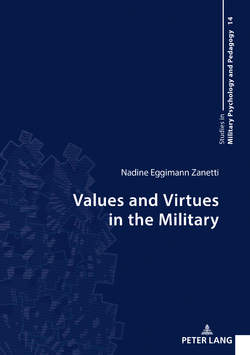Читать книгу Values and Virtues in the Military - Nadine Eggimann Zanetti - Страница 14
На сайте Литреса книга снята с продажи.
ОглавлениеManagement Summary
Expressions describing values and virtues (e.g., honesty, security, loyalty, integrity) have always been a top priority within the military context of leadership, training, ethical commitment, and psychological research. Values and virtues are qualified as morally good, positive characteristics of personality (De Raad & Van Oudenhoven, 2011). Likewise, concepts of positive psychology such as character strengths, values, and virtues are regarded as highly influential on work satisfaction, individual performance, motivation, adaptability, and effective leadership in the military context (Matthews, Eid, Kelly, Bailey, & Peterson, 2006b). Additionally, the military environment is a natural home for concepts of positive psychology and their overall importance is widely documented (Matthews, 2009). This bolsters the inclination to view the military, specially the Swiss Armed Forces, as a value-oriented organization. However, there has not yet been an empirical psycholexical consideration of military values and virtues and a corresponding analysis of the factorial structure within a military organization. Combining the method of a psycholexical approach with a factorial analysis as part of the structural assessment of values and virtues enables to identify cultural-sensitive characteristics of the organization.
The current thesis investigated military values and virtues within the Swiss Armed Forces, with the focus on a psycholexical-based identification of military value and virtue descriptors and the assessment of their factorial structure. Data were collected from professional and militia military persons across the entire hierarchical levels of the Swiss Armed Forces. The validity of the resulting military value and virtue factors was further explored by relating them to (a) measures of universal values by the Austrian Value Questionnaire (AVQ; Renner, Salem, & Alexandrowicz, 2004), (b) the Big Five personality traits (Big Five Inventory; John, Donahue, & Kentle, 1991), and (c) the five second-order factors of character strengths by the Values in Action Inventory of Strengths (VIA-IS; Peterson, Park, & Seligman, 2005). Furthermore, the positive outcome of military values and virtue factors was verified with regards to organizational citizenship behavior (OCB; Organ, 1997) and motivation to lead (MTL; Chan & Drasgow, 2001) among Swiss recruits.
As part of the Pre-study, the Military Values and Virtues Catalog (MVVC) was developed. The scope included the identification of 25 military value- and 42 virtue-descriptive expressions, evolving from a psycholexical-oriented ←19 | 20→analysis of military guidelines and in line with the prioritizing ratings as assessed by the top executives of the Swiss Armed Forces.
In Study I, the corresponding catalog was given to a sample of 550 career officers and career non-commissioned officers (NCOs) to capture the rating with regards to each specific military value and virtue as it applies to everyday military decisions and actions. Principal component analysis in combination with Goldberg’s top-down approach delivered five military value categories (in terms of factors) reflecting the Swiss military culture, characterized as Freedom (I), Social Cohesion (II), Good Soldiership (III), Mutual Respect (IV), and Military Conformity (V). Relating the correlations with the Big Five personality traits (i.e., Neuroticism, Extraversion, Openness, Agreeableness, and Conscientiousness), the strongest ties were found between Good Soldiership (III) and Conscientiousness, as well as between Mutual Respect (IV) and Agreeableness. In regards to the five universal values (i.e., Intellectualism, Balance, Religiosity, Materialism, and Conservatism), Good Soldiership (III) showed the highest correlation to Conservatism, while the correlation coefficients were generally not higher than between military values and personality traits.
In Study II, the MVVC was administered to 270 militia officer candidates from different service branches, with the goal of assessing the structure of the 42 military virtue-describing terms. Applying the same methodological approach as in Study I, four military virtue factors were found: Fortitude (I), Suitable Behavior (II), Reflection (III), and Empathy (IV). The four-factorial structure of the military virtues showed a characteristic correlation pattern with the five second-order factors of character strengths (interpersonal strengths, emotional strengths, intellectual strengths, strengths of restraint, and theological strengths), highlighting that military virtues build upon the universal-related strength factors. Specifically, emotional strengths were strongly related to the four military virtue factors, among which the highest correlations related to Fortitude (I) and Suitable Behavior (II). Additionally, Fortitude (I) correlated negatively with strengths of restraint.
Study III included data obtained from Swiss military recruits (N = 391) undergoing basic military training. In detail, the objective was to analyze the effects of (a) universal values and (b) military values and military virtues on OCB and on the motivation to pursue a militia cadre career (MTL). In multivariate analyses, Intellectualism and Harmony, among universal values, as well as Good Soldiership (military value factor III) and Fortitude (military virtue factor I) proved to significantly determine OCB and MTL. Military values and virtues showed a larger criterion validity in reference to OCB than to MTL. Furthermore, an incremental contribution of military values and military virtues beyond the ←20 | 21→universal values with regards to the prediction of OCB and MTL was found.
Finally, 19 international military organizations were consulted, to inquire about the practical use of a classification of military values and virtues, and about the existence of similar research activities. The result was that 12 organizations confirmed that they apply the principles of core values and virtues, confirming the positive impact in fostering successful leadership.
The overall outcome of the thesis confirmed that the identification of the military-specific factors of values and virtues required a psycholexical and factor analytic approach, which allow to interpret the cultural-specific aspects of the results. The findings are providing implications for military education, training, and leadership and fundamental input for extended future research.
←21 | 22→←22 | 23→
